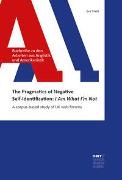Read more
This book explores how variants of "I'm not a/n..." function as a linguistic strategy in web forums, revealing how users present themselves while negotiating shared interests. It starts from the premise that identity is not fixed but performed in interaction, shaped by situational and sociocultural factors. In disembodied online communication, negative self-identification positions speakers in relation to their claims and highlights relevant identity categories. Through a corpus-based study, this book uncovers patterns of meaning-making and guides readers through conducting research in discourse pragmatics. It will be of interest to students of English linguistics, scholars in applied linguistics, and anyone curious about the links between language, identity, and the social world.
List of contents
1. INTRODUCTION2. IDENTITY, (NEGATIVE) SELF-IDENTIFICATION AND THE SOCIAL WORLD2.1. Conceptualizing identity2.2. Contemporary struggles around identity 2.3. The discourse context: Self-identification on web forums2.4. Summary3. THEORETICALLY CONTEXTUALIZING NEGATIVE SELF-IDENTIFIERS3.1. Studying forms, meanings, and functions3.2. Theorizing negatives3.3. Theorizing the identifying noun phrase3.4. The structure "I + copula + NOT + identifying NP" in British English3.5. Summary4. FUNCTIONALLY CONCEPTUALIZING NEGATIVE SELF-IDENTIFICATION4.1. Negative self-identifiers as speech acts4.2. Negative self-identifiers as context-dependent meaning potentials4.3. Negative self-identifiers and (corpus-based) Critical Discourse Analysis4.4. Summary5. THE EMPIRICAL STUDY: DATA AND METHOD5.1. Theoretical and methodological principles5.2. Data selection and collection5.3. Summary6. THE EMPIRICAL STUDY: ANALYTICAL APPROACH AND ANNOTATION6.1. A formal-functional framework of negative self-identifiers in use6.2. Corpus annotation6.3. Data analysis6.4. Summary7. CONCEPTUALLY PROFILING NEGATIVE SELF-IDENTIFIERS7.1. Theoretical considerations and methodological principles7.2. Results7.3. Summary8. NEGATIVE SELF-IDENTIFIERS AND THEIR IMMEDIATE CO-TEXTS8.1. General co-textual profile8.2. Negative self-identifiers and their formally related co-texts8.3. Summary9. THE DISCOURSE FUNCTIONS OF NEGATIVE SELF-IDENTIFIERS9.1. Functional analysis of formally related co-texts9.2. Functional analysis of co-texts preceding negative self-identifiers9.3. Qualitatively studying negative self-identifiers in context9.4. Summary10. DISCUSSION AND CONCLUSION11. REFERENCESAPPENDIX
About the author
Eva Triebl ist angewandte Sprachwissenschaftlerin im Bereich Anglistik und arbeitet als Lektorin an den Universitäten Wien und Klagenfurt.
Ihr Forschungsinteresse liegt in der korpusbasierten, pragmatisch orientierten Kritischen Diskursanalyse. Dabei konzentriert sie sich insbesondere auf pragmatische Strategien zur Legitimation von Meinungsäußerungen und zur Konstituierung von Expertise in digitalen Medien.
Summary
This book explores how variants of "I'm not a/n..." function as a linguistic strategy in web forums, revealing how users present themselves while negotiating shared interests. It starts from the premise that identity is not fixed but performed in interaction, shaped by situational and sociocultural factors. In disembodied online communication, negative self-identification positions speakers in relation to their claims and highlights relevant identity categories. Through a corpus-based study, this book uncovers patterns of meaning-making and guides readers through conducting research in discourse pragmatics. It will be of interest to students of English linguistics, scholars in applied linguistics, and anyone curious about the links between language, identity, and the social world.

